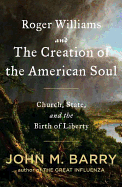
In most American high school history classes, Roger Williams is summarized in a single sentence, if at all: after being booted out of Massachusetts for insufficient conformity with the Puritan vanguard, he founded Rhode Island on the principle of religious freedom. That reductive description, however, elides over his significant contribution to our understanding of religious freedom and the separation of church and state--a contribution John M. Barry explores in careful detail in Roger Williams and the Creation of the American Soul.
Born in England in 1603, Williams spent his formative years taking notes for noted lawyer and parliamentarian Sir Edward Coke, exposing him to the hottest political debates of the day. He arrived in the Massachusetts Bay Colony in 1631, soon becoming a pastor to the colony's emerging Puritan churches. Unlike his neighbors, however, Williams believed that government ought not to consult any church in making its decisions and, furthermore, that government had no business regulating affairs of conscience or belief. Banished from the Bay, he founded Providence Plantation in 1636, constructing its government on the theory that people could participate in their own state-related affairs but that their church affiliation, or lack thereof, was nobody's business.
Barry relies heavily on period sources, but saves the reader the trouble of dealing with the 17th century’s casual relationship with spelling by quoting them only lightly. Instead, the author’s own straightforward voice and obvious fascination with his subject carry the content, making Roger Williams and the Creation of the American Soul as highly readable an exploration of the colonial foundations of the understanding of state power that shaped the U.S. Constitution as it is balanced and thorough. --Dani Alexis Ryskamp, blogger at The Literary Cricket

